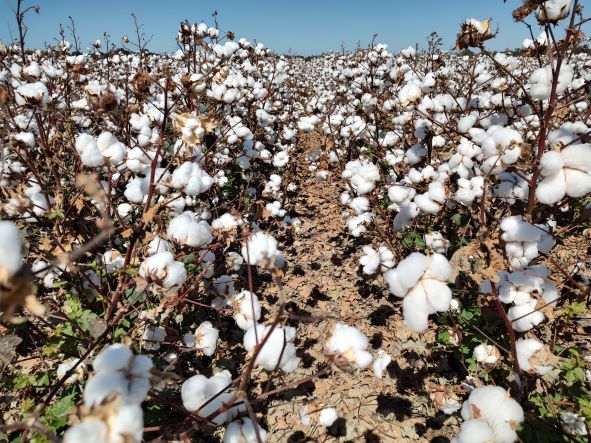Cotton Market Showing Positive Movement
The dog days of August are over, and cotton has climbed back to 70 cents. Cotton prices backed and filled all week with a couple of triple digit gain days with only limited pressure to push prices lower. Effectively the market kept the big gains made last week. The primary harvest month, December, settled at 69.99 cents – one point below the Friday open, but up seven points on Friday (Aug. 30) trading.
As we have commented for weeks, there is nothing bullish in the works, but at least the day of the Bear has passed.
Our long-standing word for the market excitement has been “positive,” and we will stick with that. The 75-cent level is within reach and the pump remains primed for a later challenge of the 78-80 cent mark. Yet, that challenge will have to wait until the March and May contacts.
Too, as has been mentioned several times, there is nothing bullish in the marketplace. The potential for higher prices is based solely on supply. The year-long struggles faced by demand continue without any sign of improvement. Yet, cotton is moving around the world, but the primary benefactors are the Brazilian growths. Much of the U.S. business, very meager as it is, is for immediate-to- fill-in needs with mills still not searching for second quarter needs.
Over the past two months, we have mentioned that the lead contract, October, would spell the future of the upcoming harvest contract, December. For months, prices have fallen in tandem on both contracts. However, there has been a subtle but very fundamental change. It is now commonplace for December to trade above October and vice versa on any given day. This is a signal that demand deterioration has ended, and the market has found a price equilibrium point.
More specifically, the suggestion is that the market has established its bottom and has begun the very long process of moving higher. Prices will move a few cents higher between now and harvest, but more importantly we have taken the 67-cent low off the board. The market will now spend time in the very low 70s, fighting to break above 73 cents – likely another six weeks longer, with the next objective of 75 cents.
Don’t expect that anytime soon. The truly positive news is that the bottom is in, the tooth pulling is over. Yet, the road to higher prices will be a slow one. Remember, this is strictly a supply driven market.
However, while the market has focused on the negative demand news, increased attention is being directed to the realization that world production could fall nearly as low as the prior year’s 114 million bales. The current USDA estimated world production is 118 million bales. The market is suggesting 2024-25 production could fall as low as 116 million bales.
Net sales of U.S. cotton on the week totaled 135,200 bales, a marginally acceptable amount. Pakistan was the primary buyer, a clear indication that their crop will likely be 1.5 million bales below the current USDA estimate. Thus, Pakistan will continue as a major buyer. Other principal buyers were Mexico, Vietnam, and India. It is likely that the Indian crop will be further reduced, and India will continue as a buyer of U.S. cotton.
Exports shipments continue to lag expectations, yet the cotton year is not yet a month old. Weekly shipments totaled only 144,200 bales of upland with China, Vietnam, Turkey, Bangladesh, and Pakistan as the primary destinations. Shipments are well behind the pace needed to reach the USDA’s estimate of 12.0 million bales for the year.
Granted, demand continues to disappoint. However, we also note that non-U.S. cotton is finding favor in traditional U.S. markets. Additionally, we also note that there is more non-U.S. cotton being hedged on the New York ICE (aka New York Cotton Exchange). Thus, with the October and December contract prices essentially being even, this is another indication that the price floor is in. Growers are still cautioned that many will need to price their crop off the May or July 2025 contracts to obtain their desired price.
Give a gift of cotton today.









